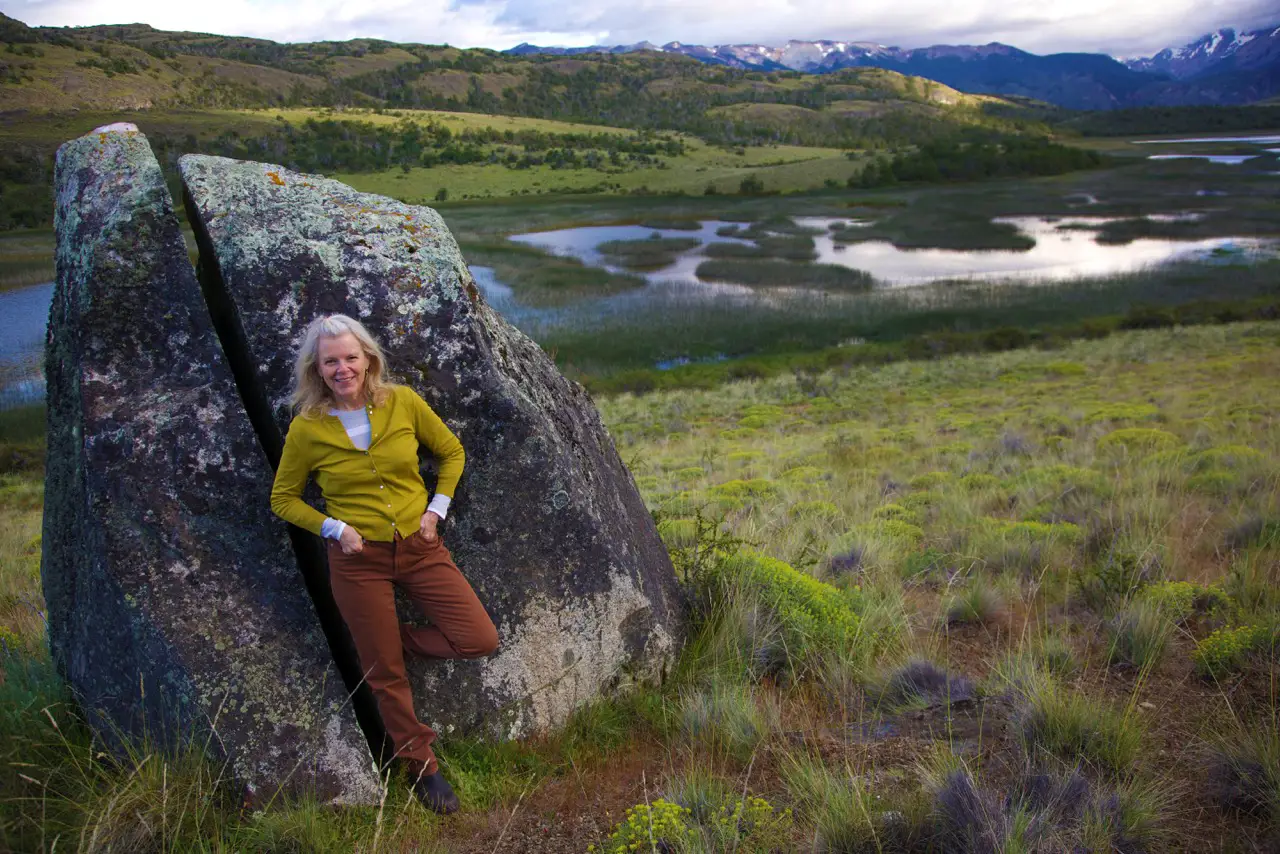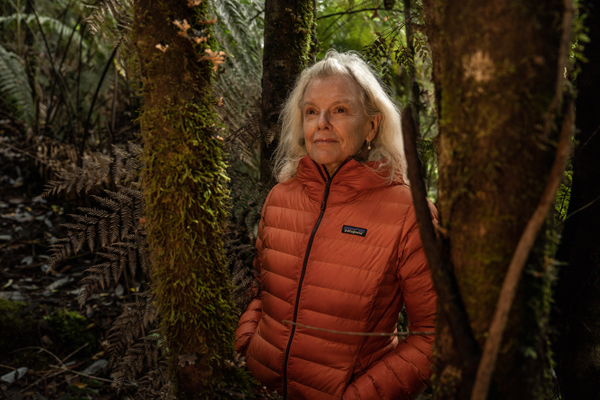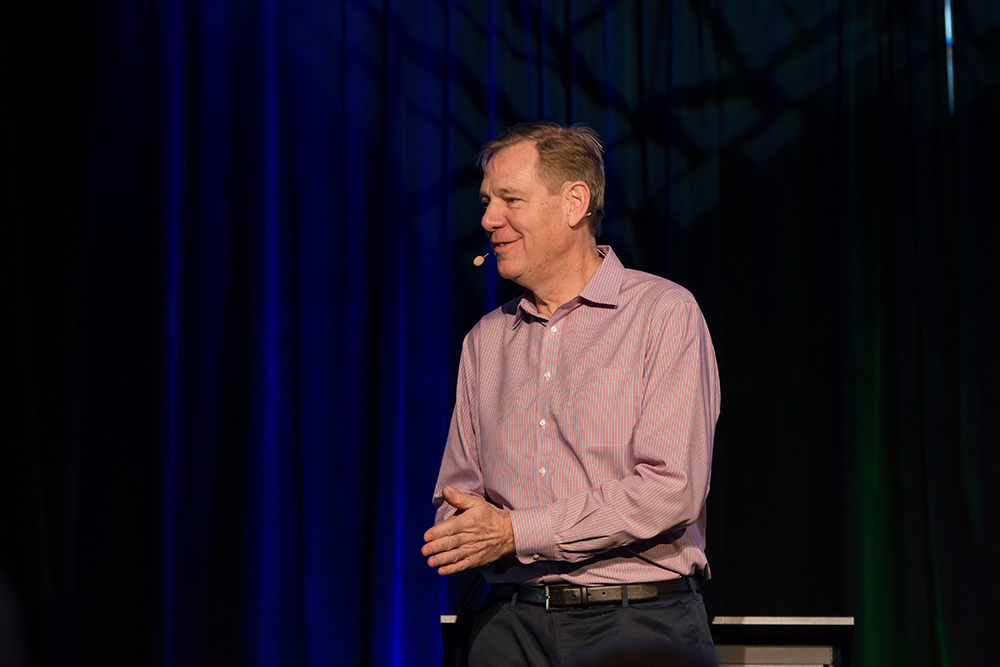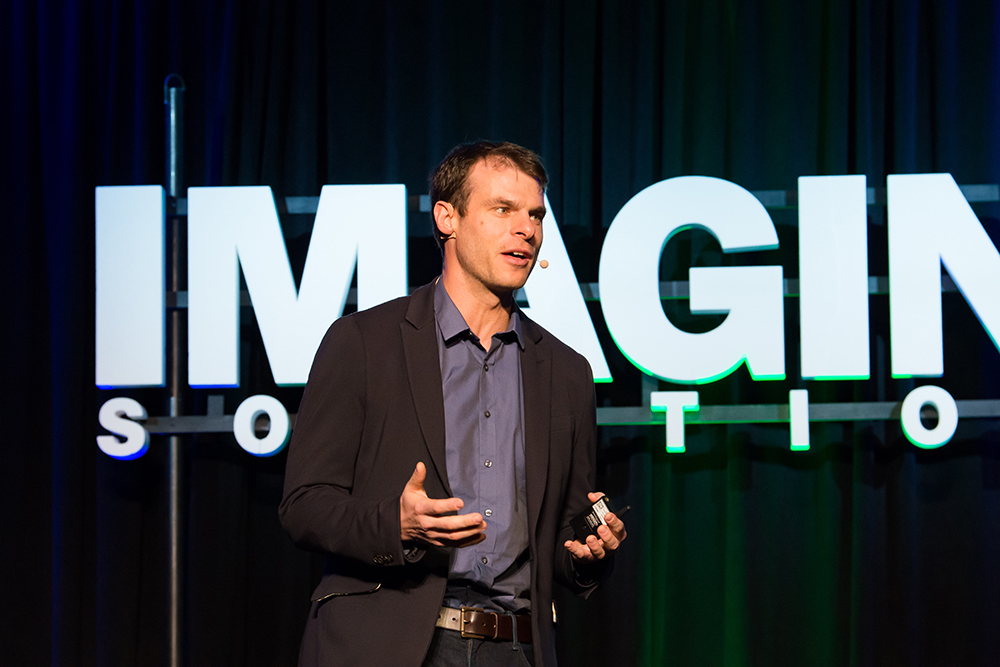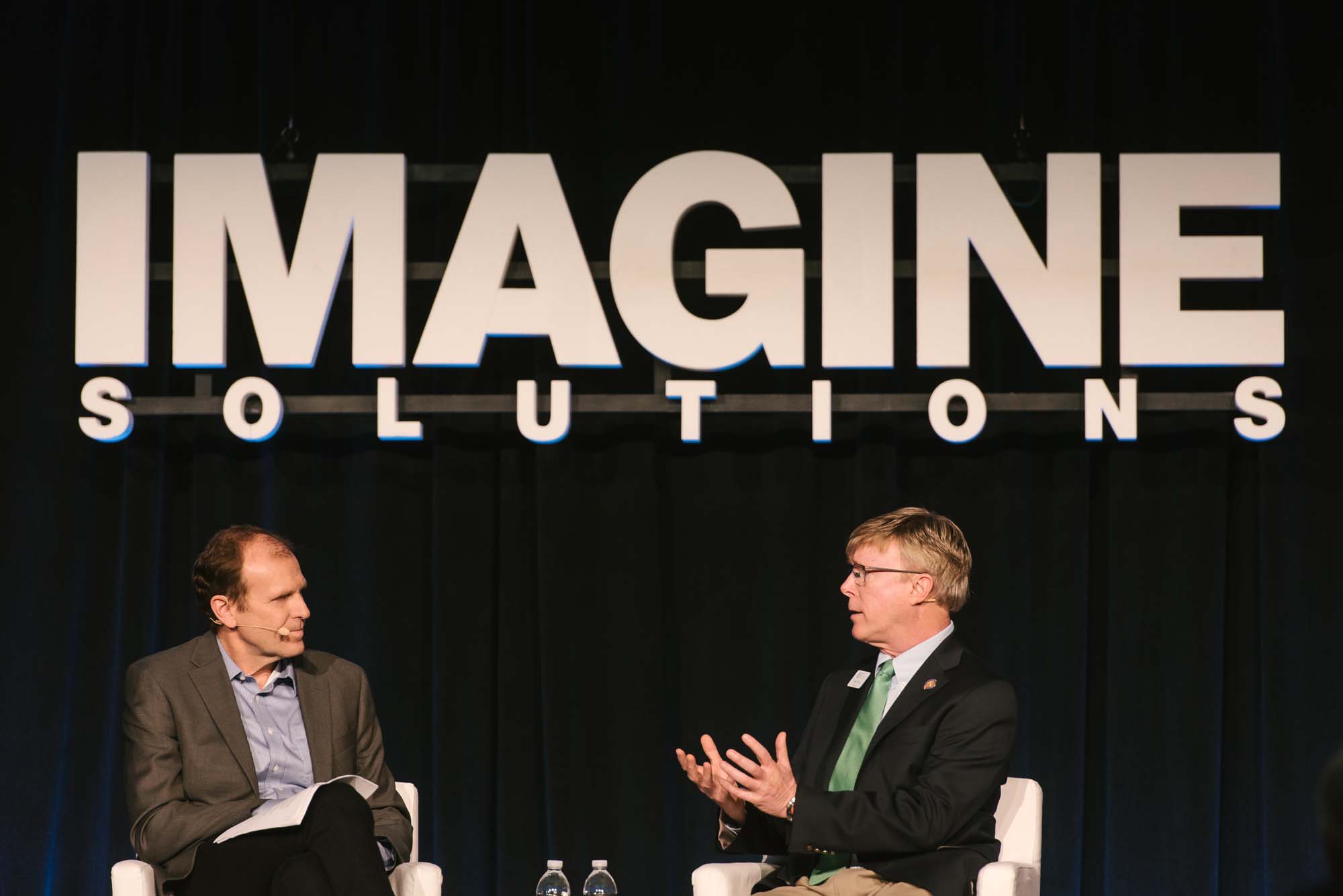Kristine Tompkins
Conservationist Kristine Tompkins delivered a deeply moving and visually stunning talk about her decades-long effort to protect wild places. Former CEO of Patagonia, Tompkins now leads the largest private land donation movement in history—helping to rewild millions of acres across South America. With breathtaking footage and personal stories, she showed how preserving nature isn’t just an environmental issue—it’s a human one. Her message was clear and galvanizing: the future depends on bold, collective action to restore our planet.
00.11
christine Tommpkins donated more than 2 million acres of wilderness to create or expand 15 national parks in Argentina and Chile Hers is the single largest donation to conservation and reing in our lifetimes She's a visionary and a hero in the world of conservation Uh and she remains an explorer with a deep love for wild untouched places And Tomkins the longtime CEO of the outdoors brand Patagonia comes to us today from one of those wild places Antarctica Right now Christine is on an expedition way and I do mean way down under But with the magic of Zoom she will join us from 8,400 miles away with a pre-recorded presentation Please welcome Christine Tomkins
01.22
Three decades ago entrepreneur Doug Tommpkins made a 180°ree turn in his life to reckon with a planet out of balance In less than a century wild ecosystems have gone from 75% of the Earth to a mere quarter of the planet Our own human actions are bringing us to the brink of collapse But at Tomkins Conservation we're working to rewrite this story Just in my lifetime we have seen unbelievable change Everybody can see the effects of climate change It's on It's happening The role of healthy ecosystems
02.03
is absolutely essential That's what we fight for We're rewilders We're going for the whole horse Tommpkins conservation started in the early 1990s when Doug Tommpkins co-founder of Aspree and the Northace landed in the wilds of South America with Chris McDivic Tomkins the former CEO of Patagonia They traded in their lives as global business leaders for ancient forests vast grasslands and wetlands Local teams joined in to do the seemingly impossible Make nature whole again Following Doug's mantra to commit then figure it out At Tomkins Conservation it's our mission to protect and rew the earth Over the last 30 years we've helped create or expand 15 national parks in Argentina and
03.00
Chile protecting 15 million acres of land and 30 million acres of ocean Hello everybody My name is Chris Tommpkins I'm the co-founder and president of Tomkins Conservation And thank you very much to Imagine Solutions for inviting us into your gathering to talk about our conservation and reing work I'm sorry I'm not there in person I'm on a ship in Antarctica and this is as close to you guys as I can get to at the moment But I think one of the reasons that uh I was so interested in participating with all of you is I know many of you come from the business community And one of the things about our story is that both Doug and I came out of business lives before we decided
04.00
to change our lives 180 degrees Doug was the founder of the Northace company and sold that and then he and his former wife Susie um started a spree uh a very big fashion company and I was the CEO of Patagonia company for over 20 years At in the early 90s both of us quite separately began to feel that being in business happily though we both were was also becoming more of a conflict in terms of our own um growing uh concern about the state of the planet not only forests and grasslands but also the loss of biodiversity So making the decision to
05.00
leave our former business lives was massive at the time But we could never have guessed in that moment that what would be much more complex much more interesting in a certain kind of way and definitely a bigger challenge was to try to acquire aggregate large tracks of land and we're talking about millions of acres and protect them if they're if they were pristine restore them if they had already been damaged and again bringing back species in the non-human world who had gone missing altogether or whose numbers were low and fragile and this was uh a change in our work but our daily life our lifestyle we went from working in Paris or New York City
06.01
uh to living in a roadless area in the extreme south of Chile in the early '90s and building teams of Chileans and eventually teams in Argentina as well to craft what would become the largest private donation of land in history And this of course these big projects take great people who are willing to live in very isolated places and be in the field every day A lot of my business experience has really helped me in conservation and reing work And here's why one when you're coming out of business you really have a kind of discipline and relentlessness that some people just aren't trained to have That's one thing One of the other great things that comes
07.02
from the hard knocks of being in business is the understanding that as a CEO any leader one of their major responsibilities is to make sure that whatever you're driving whatever uh corporation entity you're in charge of you build the system into the system for succession And when my husband died 9 years ago in a kayaking accident I immediately turned to the two teams we had built over time and with whom we'd worked with for almost 25 years one in Chile and one in Argentina And I said "You guys need to be independent as quickly as possible because if something happens to me we want you to be as tough and as clear and and with every skill you need to take
08.02
the second generation on So this has taken place in Argentina It is a fully independent team named Reing Argentina and the same thing in Chile Fully independent rewing Chile and they're working not only with they are the leaders of the second generation of Tomkins conservation but we now work with the third generation of Tomkins conservation through these groups and for me that's what matters So I get asked a lot like actually what is reing and I want to say this it is a very simple idea and very complex to get it done Reing in its broadest sense is looking at a landscape a
09.01
seascape and protecting it That's absolutely essential And the bigger the better But what's taking place inside those territories What species are gone Who's missing Because in the absence especially of keystone species the species that sit at the top of that entire territory the ecosystem cannot function properly And when ecosystems don't function properly they collapse eventually So it's not enough to protect the territory You have to ask yourself who's missing And are we willing to bring them back And in our case this has become as much of our daily work as any of the conservation of large territories has been So the teams in rewing Chile and Re
10.04
and Argentina every time they make a commitment to bring a species back it's a whole new set of circumstances and a whole new set of challenges And I bring this up because losing a species is pretty easy to do You're taking your eye off the ball You don't care what havoc is raised when you log a million acres of forest But to bring them back is exacting very intense work But why do you do it Because if you don't do it you begin to lose massive continental scale territory And this will be our final undoing I'm proud of what we've done over the last 30 years but what really interests me what is really important to
11.00
me is that there yes there there were these two people called Chris and Doug but their leadership of the second generation and the third generation And I think before I'm gone I may even see some of the members of the fourth generation And then it becomes very interesting because all we're looking for is impact in our work What matters is what do we do out in front of us not so much what we've done behind us So we get asked a lot like why would you leave these fantastic companies that you were leading and um commit yourself to conservation the last for the last third of our lives Today 95% of the earth's surface is used toward some human-based project extraction On the wildlife front since the 1970s
12.01
73% of wildlife has vanished forever Those are big numbers and they matter And they matter because we are the generation many of you and certainly me are coming out of the baby boomer age We are the generation who should have been stopping some of this who should have been making different decisions but we have not been willing to look at the costs on nature and really 80% of the humans who live on this earth So now today it's a moral issue 30 years ago 40 years ago we didn't really understand what was taking place on this planet Today we all know what's taking
13.00
place We know the relative velocity the pace it's taking place and we understand that especially people coming out of business who really move the needle on a lot of these issues have no choice but to look our at ourselves in the mirror and ask ourselves who are we We know these things are taking place and once we know something and we choose not to act it's a kind of abdication of not only our futures but everybody else's who has less opportunity to make an impact to slow things down and change the direction of this train So I know that as you gather in Florida a lot of conversations like this will come up And I I tell you all with my whole
14.03
heart that abdicating your own futures goes against our own sense of personal survival But it also becomes a moral issue that we cannot set aside We can't do it It doesn't take a genius to be good at business There are a lot of good companies out there There are a lot of good people out there But being good is not enough We have to go for great And what does great mean It means that driving companies toward a singular end which is generally profit is not exceptional anymore There are a lot of very average people who do it What it takes
15.01
is asking ourselves to be great to be so much more And this is where things become really interesting And this is why no doubt you guys are gathered in Naples Florida to talk about what can be done But a huge step is taking the if the conditional we could do this we would do this because that train has left the station In my opinion imagining solutions is not an elective anymore It's imperative that we do that and we force ourselves to in my opinion have lives that are far more complex and complicated than we have been behaving as because the times call for this to
16.01
change history That's where it becomes interesting and that's where all of us better find ourselves Not in the abdication of the future of life but rather using all of these assets that we've built up all the things we got right and a lot of the things we got wrong And be bold We have nothing to lose Our strategies are large and aggressive and relentless Yes But are they at a scale that's keeping up with the velocity of climate change with the velocity of the loss of species around the world And our answer to that was no We should go back in look at everything we do and how do we change the velocity and scale of the work that we're doing
17.00
So about a year ago we decided of the millions of acres that we work on it's still not enough So we committed oursel to break out of that mold and start looking at conservation and rew on a continental scale Reconnecting the southern cone of South America up to the rest of the continent That's from Patagonia up to the Amazon And both in Chile and Argentina this has evolved to be where we think everybody needs to be working You can't think big enough today when it comes to these kinds of projects So no matter what you're doing after the experience that I've had both in my business life and in conservation and reing it is
18.00
impossible to worry about the audaciousness of the ideas that you have Give yourselves the space and the confidence to go for broke I really believe this and I'm almost 75 years old but I believed this 30 years ago We have nothing to fear except our own inaction and our ability to be great and not just good I'll end on this I get asked a lot of times whether or not I have hope about the future And I'm really sick of this question that comes to me because I can see that people ask me and if I say yes I have hope then they can relax Hope is a muscle We have to earn hope We can't walk around hoping that it's all going to
19.00
work out And I really believe that um if we want hope we have to work like hell and deserve it Join in the process of people around the world of deciding that enough is enough Change your lives Change the story Thank you

